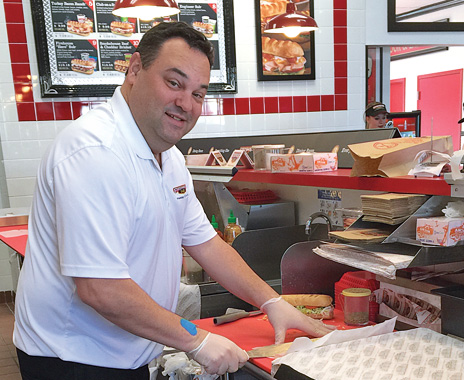For 16 years, Jeff Finnerty was deep in the restaurant industry—as a Coca-Cola account manager. Finnerty started out on the West Coast, working mostly for local shops in the Coca-Cola Company’s foodservice and hospitality division, before he moved up to representing larger regional chains.
In 2008, Finnerty became part of the national accounts division and began working with Firehouse Subs. Partly because of his efforts, Firehouse Subs became the first chain to adopt Coca-Cola Freestyle, a dispensing system that allows guests to choose from among 100-plus beverages to create their own custom fountain drink.
Throughout his time as a vendor, Finnerty learned a great deal about the quick-service industry, particularly Firehouse Subs—so much so that he decided to sign on as a franchisee and operate his own unit in his home state of Connecticut. This year, he opened the doors to his first location in the Hartford area. Finnerty’s experience as a vendor has led to a successful start, and he’s already planning to open five more stores over the next five years.
Finnerty recounts how his years as a vendor ultimately shaped him into the franchisee he is today.
1. Choose wisely
I worked with a lot of franchised systems as a vendor with Coca-Cola—some local, some segmented, and other mass-market brands. I never really thought to get into the business myself until I developed a close relationship with Firehouse Subs. Every Firehouse I went into seemed to be operating smoothly, with passion, and I think that comes from the top down, starting with the franchisor. I never did an extensive amount of research before making the decision to own a restaurant because I felt like the research was right in front of me.
Measurements are good, but if you’re looking to become a franchisee, spend time in the actual stores. The brand culture should be apparent wherever you go, and that’s what ultimately made my decision. My role at Coca-Cola enabled me to see inside a number of different concepts, which was a huge advantage but easily doable through your own research. Get inside the units; talk to franchisees and area developers to get the nitty-gritty. The relationships that you build along the way will only help you down the road. Ask the silly questions and get all of the advice you can.
2. Embrace the franchise system
The biggest and most recurring issue I saw across quick-serve concepts was operators trying to do too much. There was a general lack of faith that folks at the corporate level were making the best-informed decisions possible, and operators would get angry over it.
To me, it was always so confusing to see this, because that’s who you are paying your royalties to. Rather, you’re paying them so you don’t have to think about it.
Now an operator myself, I feel comfortable knowing certain elements of this business are not my job. The more time spent worrying about corporate-level decisions, the less and less time gets devoted on the business when you worry about things you cannot control.
3. Stay current
Operators have been educated to manage their P&Ls around percentages. While those do have merit, you don’t go into the bank every morning and deposit a percentage. We’ve seen the industry change with the emergence of fast casual, and those percentages are all thrown off. Decisions in quick service often get made in a spreadsheet rather than through exploring opportunities for premium offerings or new technology. Very few new options are going to come to you as a reduction of food costs. If you’re focused on simply shrinking your overall costs, you’re going to miss the boat on new advancements that can take the business to the next level. There’s a benefit to some of these higher-cost items.
The fountain beverage world hadn’t changed in more than 80 years, but now it’s hard to imagine certain concepts like Firehouse without a Coca-Cola Freestyle. Operators who see long-term benefit over numbers will see early benefits in new advancements.
4. Be prepared and ready to misstep
I spent 16 years as a Coca-Cola vendor to multiple concepts. I provided insight and market research, and sat in on meetings with countless brand executives and CEOs. Having all of that experience in my arsenal, it became apparent very quickly how little I knew about actually running a franchised location. Your past experience will help, but only to a certain degree.
Mistakes will be made, but the curve will soften a little more each day. For me, I never had to manage an entire staff. Being the first Firehouse Subs in the state of Connecticut, their entire knowledge about the brand, the product, and the operations all comes from me. Even with all that experience in the industry prior to becoming a franchisee, I had to learn a lot of new concepts and techniques to make sure the doors stayed open.







